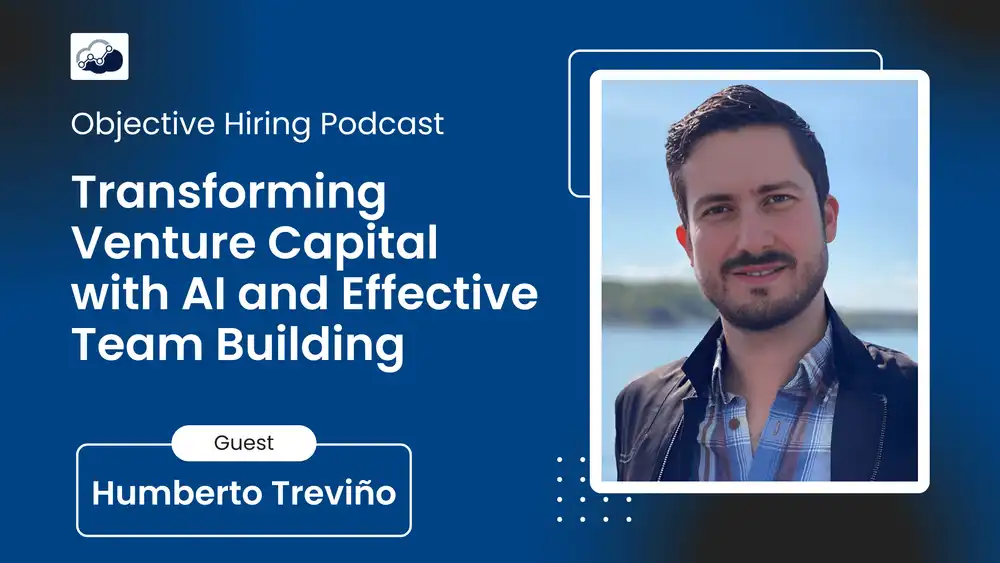Humberto Treviño on Why Soft Skills and Motivation Matter More Than Technical Fit in Hiring

Humberto Treviño on Why Soft Skills and Motivation Matter More Than Technical Fit in Hiring
Technical skills get people in the door. But according to Humberto Treviño, they’re rarely what determines whether a hire succeeds. On the Objective Hiring podcast, he spoke with Tim Freestone about the hidden costs of overlooking values, soft skills, and drive in the hiring process—and how to do it better.
“You can always teach technical skills. But the one thing you cannot teach someone is the soft skills that are intrinsic to the person.”
What Really Matters in Hiring?
When building teams, Humberto looks well beyond resumes and checklists. He focuses on whether a candidate can grow, adapt, and contribute over the long term.
“Especially in data, the technical skills evolve so fast they’re valid for a few months, and then they’re outdated. What matters is what you carry as a human—your values, your drive.”
He evaluates qualities like curiosity, teamwork, ethics, resilience, and learning agility—traits that can't be captured in a traditional CV.
How to Assess the Intangibles
It’s not easy to gauge character in an interview. That’s why Humberto extends the process for senior hires. He speaks with candidates multiple times, sometimes over coffee or lunch, and asks about how they handle stress or what drives them personally.
“I like to spend time with people. I want to understand their underlying motivations for being involved with us.”
He also digs deep when checking references—not just what someone delivered, but what it was like having them on the team.
“I want to know what it was like to have him around. Were they engaged? Were they aligned with the team’s values?”
Avoiding the “No Red Flags” Trap
Many hiring managers settle for candidates who simply don’t raise concerns. Humberto says this is a dangerous mindset—especially in startups.
“I was hiring for whoever didn’t give me a reason not to hire him. But the bar should be: has this person excelled at each stage?”
“In startups, every person has a profound impact. If you hire the wrong person, it can set you back significantly.”
Tim reflected on a similar evolution in his own hiring strategy, moving from “no objections” to “clear excellence.”
Hiring for the Future, Not Just the Now
One common mistake Humberto sees? Hiring for today’s role, not tomorrow’s needs.
“How do you envision your team in one, two, three years? Will this person grow with the role and the pressures to come?”
In a startup, flexibility and growth are more important than perfect fit today. Hiring someone without those capabilities can leave you scrambling six months down the line.
“Startups change fast. The person you hire today might need to wear three different hats by next quarter.”
Screening for Behaviour, Not Just Talk
Storytelling in interviews only goes so far. Humberto and Tim discussed ways to let candidates show—not tell—their values and learning ability.
“We figured out the most important thing for us was: can this person learn new things quickly?”
Tim shared an approach used at Alooba, where software engineers were given a short challenge in R—a language they didn’t know—to test adaptability and curiosity.
“It was a way to force them to show whether they had the right attitude and learning mindset. If they dismissed it or gave up, that told us everything.”
Similarly, Humberto uses case exercises and even assessment centres to observe how candidates work, think, and collaborate under pressure.
“It doesn’t matter what their answer is. I want to see how they think, how they handle challenges, and how they work with others.”
First-Time Leaders: Don’t Outsource Hiring
Humberto had some clear advice for new managers.
“If you're hiring someone, it means you're now delivering through people. Your success depends on them. So why wouldn’t you give hiring your full attention?”
He’s surprised by how many new managers either neglect hiring or delegate it entirely to HR or junior staff.
“It’s shocking how little some managers understand how critical it is to hire the right person. It’s not something you can just hand off.”
Instead, he suggests approaching hiring as a strategic responsibility—one that directly shapes the team’s and leader’s success.
Learn From Experience (and Mistakes)
Bad hires leave a mark—and Humberto has had his share. He recalled one candidate who looked perfect on paper but had the wrong motivations. The signs were there, but the team ignored them under time pressure.
“He was just there to use us as a stepping stone. He didn’t want to be part of the success story. We realised it immediately once he started.”
When a hire doesn’t work out, the lesson stays with you.
“When something’s telling you it’s not right, pay attention to it. More often than not, your gut is right.”
The Role of Gut Feel in a Data-Driven World
Despite being a data professional, Humberto defends the value of intuition.
“Gut feeling is more than just gut feeling. It’s based on your experience, your culture, your context. It’s your internal model making a decision.”
He believes there’s still a place for instinct—especially in areas like values alignment and team dynamics, which are hard to quantify.
Final Advice
For new leaders building a team, Humberto’s message is simple: start with a plan, understand your evolving context, and focus on the person—not just the profile.
“Understand your context. What will the challenges be in the next one to three years? Hire someone who can grow with your goals.”
And remember: technical gaps can be closed. Value misalignment can’t.
“Drive and intrinsic values—those things stay with humans.”
Whether you’re building a team or rethinking your process, this episode is a masterclass in putting people first.